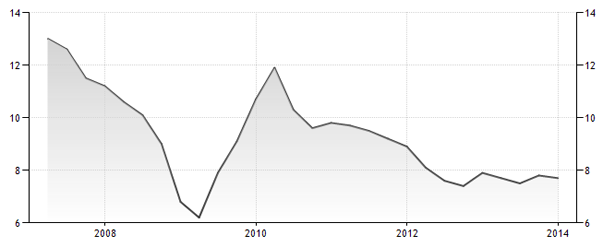The below chart spells it out pretty clearly—the Emerging Markets (in blue) have widely underperformed US stocks as measured by the Dow (in red) over the last two years:
2-Year Performance of Emerging Markets (EEM) vs. Dow Jones Industrial Average (DJI)
Blue - Emerging Markets, Red - Dow Jones Industrial Average
(Click chart for larger version)
Source: Yahoo! Finance
Not only have Emerging Markets been underperforming, they’ve just plain struggled. As an investor you probably see this and wonder - what’s the next move? Do I cut my losses and sell out? Or could this be a buying opportunity?
We think the recent Emerging Markets weakness could present an opportunity, and could actually do well for investors with a longer time horizon. In this piece, we’ll explore why.
We’ll start by analyzing where we think the current weakness is coming from, and whether it has staying power. In particular, we believe the current weakness stems from two sources: a slowing Chinese economy, and the Federal Reserve making official their intent to roll back the quantitative easing stimulus (QE3).
China’s Economic Slowdown: Cause for Concern or Hope?
For a better part of the last decade, China has enjoyed close to 10% GDP annual growth rates. It’s clear now, however, that the pace of growth has been in steady decline.1
China GDP Annual Growth Rate
(Click chart for larger version)
Source: Trading Economics, National Bureau of Statistics China
China is the world’s second largest economy,2 so decelerating growth is certainly meaningful on a global scale. In particular, the implication for Emerging Markets is that China’s demand could ease for natural resources like coal, iron ore, and materials for building. Consider that as of 2012, 124 countries considered China their biggest trading partner, so this waning demand can have a trickling effect.3
Perhaps the stock market, sensing this impending slowdown, started to discount future weakness for Emerging Markets, which ultimately put downward pressure on stock prices.
Is There a Bright Side to China’s Slowdown?
For years, the United States has lobbied China to allow its currency to appreciate.4 As a primarily export-based economy,3 China resisted this notion for a while—a weak currency means China’s goods are cheap to the world, so there wasn’t much incentive for them to let their currency strengthen. Now, that narrative has shifted a bit.
Leaders in China have explicitly stated their goal to shift the economy away from its dependence on investment and exports and toward a more sustainable emphasis on consumption spending.5 This will likely take some time, and it may certainly come at the expense of some growth in the near to medium term.
At the same time, it could arguably benefit the US and the world. Empowering the consumer in China could mean adding millions of spenders to the global economy, which could drive up Chinese domestic demand and Chinese imports—both of which benefit a world that exports to China.
How the Fed Taper Affects Emerging Economies
A second contributing factor to Emerging Markets weakness is what we’ll call “the interest rate effect.” Over the past couple of years, as interest rates were held low, money flowed into Emerging Markets because they offered better yields.6 As the Fed tapers QE3, interest rates in the US are expected to trickle up, and it’s possible that money will shift out of Emerging Markets and back to safer shores. As money flows out of Emerging Markets and back to the US/developed world, the argument goes that the US dollar will strengthen, and emerging market currencies could take a hit.
This can hurt emerging economies in two ways: for countries with current account deficits (they import more than they export), it could sting because a weaker currency means those imports are all of a sudden more expensive. On top of that, a second outcome is that a weaker currency can be inflationary, simply because you would need more money to buy the same goods.
Countries that want to fight inflation can potentially do so by raising interest rates - higher interest rates make accessing cash more difficult/expensive, which can help curb inflation but at the same time could choke off borrowing and economic activity. This could create a predicament for central bankers in Emerging Markets: they'd have to raise interest rates to fight inflation, but would have to do so at the expense of promoting growth. Not an ideal outcome.
Is Emerging Market Weakness Expected to Continue?
The IMF predicts the global economy will grow at a 3.7% rate in 2014.7 As developed market growth improves and emerging market currencies remain weak, current account deficits in the Emerging Markets could benefit from a resurgence in exports—a positive.
Looked at in simple terms, there are really two ways an investor can consider this: do you think the global economy can pull the Emerging Markets up along with it, or do you expect the Emerging Markets to be a drag on the rest of the world?
Global Economic Growth
(Click chart for larger version)
Source: J.P. Morgan Global Economic Research, J.P. Morgan Asset Management. Forecast and aggregate data come from J.P. Morgan Global Economic Research. Historical growth data collected from FactSet Economics. Guide to the Markets – U.S. Data are as of 12/31/13.
Should You Invest in Emerging Markets? Seek Help from a Financial Advisor
In conclusion, Emerging Markets could be an appropriate investment for risk investors, which is a contrarian view. Yes, China is set to slow, and the Fed is tapering—both potential headwinds. But on the other side of that, the global economy is growing and the developed world could very well pull the Emerging Markets with it.
If you’d like to speak with one of our Wealth Managers for more detail on potential Emerging Market opportunities, and how an Emerging Market strategy could fit into your portfolio strategy, please give us a call at 1-800-541-7774.
Sources:






